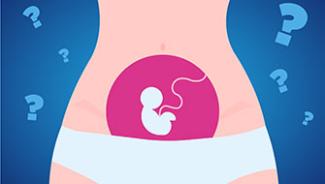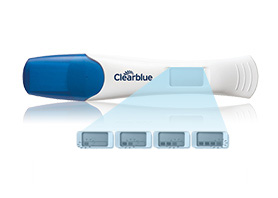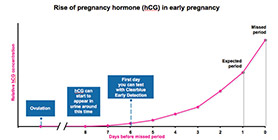There are various symptoms that can indicate you might be pregnant. These early signs of pregnancy differ from woman to woman, and from pregnancy to pregnancy. If you are pregnant, you may notice one or more of these symptoms. Don't worry, you are unlikely to get them all at once. Equally, you shouldn't worry if you don't experience any of them. It's perfectly possible to be pregnant without noticing any of these signs of pregnancy. Whether you get any of these first signs of pregnancy or none of them at all, the only way to find out for sure whether or not you are pregnant is to take a pregnancy test.
Missed or late period? What else to look out for.

1. Missed period
If you have a regular menstrual cycle, this is often the earliest physical sign. Bear in mind that you can get a little light bleeding or spotting around the time of your period even if you are pregnant, and when the fertilized egg implants in your womb. If your cycles aren't regular you may notice other pregnancy symptoms before you notice a missed period.
Some women find that after having had a completely regular cycle for a number of years, they may then not have a period for a significant length of time. The first thing to do if this happens is to rule out pregnancy, by doing a home pregnancy test.
The medical term for missing your periods for more than 6 months is ‘amenorrhea’. There are lots of reasons why your periods may suddenly stop, including putting on or losing weight very quickly, excessive exercise and stress. If you find that you are having hot flushes and a decreased interest in sex, it might be that you have the first signs of the menopause (peri-menopause). Whatever your symptoms, see your doctor if your regular periods change or stop.

Answers from our Experts
Miss Emma Kirk is a Consultant in Obstetrics and Gynaecology
at the Royal Free Hospital London
Is it normal to still have periods during pregnancy?
Miss Emma Kirk:
No, you should not be having periods during pregnancy. Any bleeding in early pregnancy may be a sign of a threatened early pregnancy loss. However many women with light bleeding, will go on to have a normal pregnancy. If you do have any bleeding, it is important to discuss with your doctor or midwife who may refer you on for an early ultrasound scan.
I know that if you test early (before your period) it’s less accurate – I just got a ‘Pregnant’ result but my period isn’t due just yet – can I trust the result?
Miss Emma Kirk :
If you have tested before your period is due and got a 'Pregnant' result this is very accurate and you can rely on the result. This means the level of pregnancy hormone was high enough to be detected.
2. Changes in your breasts
Your breasts might grow larger and feel tender or highly sensitive. The veins on your breasts may become more noticeable and your areola (nipples) may darken.
My test said ‘pregnant’ but I don’t feel pregnant – how can I be sure?
Miss Emma Kirk :
Not all women will suffer from pregnancy symptoms, such as morning sickness. Look out for breast tenderness (which may be intermittent) as this is the symptom that is most commonly reported. However all pregnancies are different so do not worry.
3. Tiredness
You are likely to feel unusually tired in the first few weeks of pregnancy. This could be due to the rising levels of progesterone in your body as it maintains the lining of your womb to help support the pregnancy.
4. Feeling sick/morning sickness
You could start feeling sick, and even vomit, between the 2nd to the 8th week of pregnancy. This usually passes by the 16th week. Although this is often called 'morning sickness' it can happen at any time of the day or night – and can even affect you all the time
I feel very sick and am struggling to eat, will this affect my baby?
Miss Emma Kirk :
Nausea and vomiting is very common affecting 8 out of 10 pregnant women. Whilst it is very unpleasant and can affect your day-to-day life, there is no evidence that nausea and vomiting has a harmful effect on your baby. In fact, you have a slightly lower risk of miscarriage. Your baby will take what it needs from your body. When suffering from morning sickness make sure that you drink plenty of water and try to eat little and often. It is also recommended that you avoid any food or smells that trigger symptoms. Some women find that acupressure bands may help. If you are really struggling, you can see your doctor who may be able to prescribe you some anti-sickness medication.
5. Hyperemesis gravidarum
Around one in 100 pregnant women could suffer from hyperemesis gravidarum. Normally continuing well past the first trimester (12 to 13 weeks), hyperemesis gravidarum causes vomiting so often and severe that no food or liquid can be kept down. Usually, the condition can be treated and only in very rare cases will cause complications for the pregnancy, but please seek doctor advice if you are suffering from severe sickness.
Miss Emma Kirk :
Hyperemesis gravidarum is extreme nausea and vomiting and can be potentially life-threatening. Symptoms include prolonged episodes of vomiting, dehydration, having ketones in your urine and weight loss. Hospital treatment may be needed. Many units now offer treatment on a day case basis, but in severe cases admission may be needed. Treatments include intravenous fluids and anti-sickness medication.
6. Going to the toilet more often
About 6 to 8 weeks after conception you may need to urinate more frequently. This is due to your uterus (the medical term for your womb) growing larger and pressing on your bladder. At the end of the first trimester your uterus rises up into your abdomen which will takes some of this pressure off your bladder.
7. Mood swings
Your changing hormones may cause some mood swings in the early stages of pregnancy – you could even find yourself crying without really knowing why.
8. Changing tastes in food (cravings) and sensitivity to smells
You may go off certain things like tea, coffee or fatty food and might start to crave things you don't normally like. You might feel queasy when you smell certain things too – like coffee, meat or alcohol.
9. Cramps
You may get cramps in your legs or feet in the first trimester, and sometimes later in your pregnancy. This is due to changes in the way your body processes calcium.
How will I know if my pregnancy is progressing normally? My friend had an ectopic pregnancy and I'm worried this could happen to me too?
Miss Emma Kirk :
An ectopic pregnancy is when the pregnancy develops outside the uterus (womb). Almost 99% of pregnancies are normally located in the uterus; however ectopic pregnancies can affect any woman. Be aware that ectopic pregnancy can present with a variety of symptoms. Not all women experience symptoms. Initial ectopic pregnancy symptoms could be pain (requiring more than a mild painkiller like paracetamol to relieve) and bleeding. If the ectopic pregnancy is rupturing you may experience a generalised tummy pain which is often associated with shoulder tip pain. Other reported symptoms include pain on passing urine, pain when opening your bowels or pain when walking. If you experience these symptoms you should seek immediate medical attention.You need an ultrasound scan to confirm the location of the pregnancy.

Know right away
If you think you might be pregnant, you need to know NOW. With our Ultra Early pregnancy tests, you can test 6 days before your missed period.

Am I pregnant (Quiz)?
If you can't buy a pregnancy test right now, try our quick "Am I pregnant?" quiz to see if your symptoms might be an early clue.




